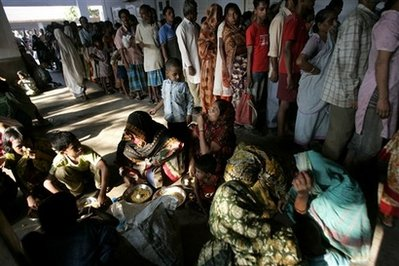People in more than 150 countries worldwide are being inspired to raise awareness on the plight of the world’s hungry and encourage action against hunger today as part of World Food Day.
The day commemorates the founding of the United Nations Food and Agriculture Organization (FAO) in 1945 and is aimed at raising public awareness and strengthening the battle against hunger, malnutrition and poverty.
"This crisis requires governments and the members of the international community to make determined and effective choices," Pope Benedict XVI said in a message read at an FAO ceremony. "Access to food is more than a basic need; it is a fundamental right of individuals and peoples."
This year, the number of hungry people around the world reached a record-high 1.02 billion amid high food prices and the global financial meltdown.
According to a report released by the World Food Program and FAO, most of the people suffering from chronic hunger are in Asia and the Pacific, where the number has reached 642 million people. Sub-Saharan Africa has the second highest number of chronically hungry people at 265 million, while Latin America, the Caribbean, the Near East and North Africa have about 95 million people.
Though worldwide gains were made in the fight against hunger in the 1980s and early 1990s, the number of undernourished people started climbing in 1995 and has since escalated to this year’s record number.
In its analysis, FAO attributed the spread of world hunger to the lack of focus on increasing food production.
While the world turned its attention and opened its pocketbooks to funding aid areas such as emergency relief, debt reduction, and improvement of government practices, it had been reducing investment in agriculture, FAO explained.
“In the fight against hunger, the focus should be on increasing food production,” FAO director-general Jacques Diouf told The Associated Press. “It’s common sense…that agriculture would be given the priority, but the opposite has happened.”
In his speech Friday, Benedict also emphasized the need for more investments, especially in agriculture, to ensure their populations don't go hungry.
"Agriculture must have at its disposal enough investments and resources," he stated.
Linda Valentine, executive director of the Presbyterian Church (U.S.A.)’s General Assembly Mission Council, meanwhile, encouraged believers to “live out the gospel imperative to share the good news with the poor, the hungry, and the dispossessed” by participating on an individual and congregational level in advocating for just economic policies and by learning more about the causes of the food crisis.
“The magnitude of the worldwide food crisis is indeed alarming, especially as we continually see how our own human hands, actions and choices are compounding what is effectively a preventable global disaster,” she commented.
With one in six people in the world undernourished, believers throughout this week – Food Week of Action – have been encouraged to address the food crisis by advocating for fairer trade rules and debt cancellation of impoverished countries.
On the final day of Food Week of Action, Oct. 18, congregations around the United States will be observing Jubilee Sunday to pray for global economic justice, deepen the communities understanding of the debt issue, take concrete action for debt cancellation for all impoverished countries, and receive a special offering to support the work of the Jubilee USA Network.
This year, Jubilee Sunday will be held in conjunction with Stand Up & Take Action, a weekend of people around the world standing up against poverty and in support of the Millennium Development Goals.















